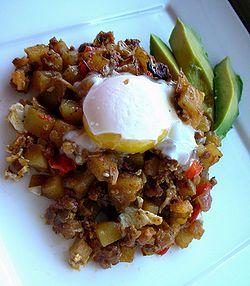- Coddled egg
-
In cooking, coddled eggs are gently or lightly cooked eggs. They can be partially cooked, mostly cooked, or hardly cooked at all (as in the eggs used to make Caesar salad dressing, which are only slightly thickened for a thicker end-product). Poached eggs are eggs that, arguably, are coddled in a very specific way: they are very gently cooked, in water that is just below boiling point.
Contents
Methods
There are two methods of coddling eggs. The first is to cook the egg in its shell, by immersing it in near-boiling water. This can be done either in a pan where the water is kept below boiling point, or by pouring boiling water over the egg and letting it stand for 10 minutes.
The second method is to use an egg coddler, a porcelain cup or ramekin with a lid used similarly to a bain-marie. The inside of the egg coddler is first buttered in order to flavour the egg and allow it to be removed more easily. A raw egg (sometimes with additional flavourings) is then broken into the coddler, which is then placed in a pan of near-boiling water for 7-8 minutes.
Coddlers have been manufactured by Royal Worcester in Worcester, UK, since at least the 1890s, and were probably invented there. Many companies[1] now make egg coddlers, and some are highly sought after collectors’ items.
Because coddled eggs are not boiled, some people may be concerned of the risk of salmonella and other bacteria. It is therefore recommended to use fresh eggs. According to the US Dept of Health, eggs should be cooked until both the white and the yolk are firm,[2] and the water temperature should be 74–82 °C (165–180 °F),[3] but children, the elderly and persons with compromised immune systems are advised against eating lightly cooked eggs because of possible under-cooking.
See also
- List of egg dishes
- Egg cup
- Boiled eggs
References
External links
Categories:- Egg dishes
- Cuisine stubs
Wikimedia Foundation. 2010.

